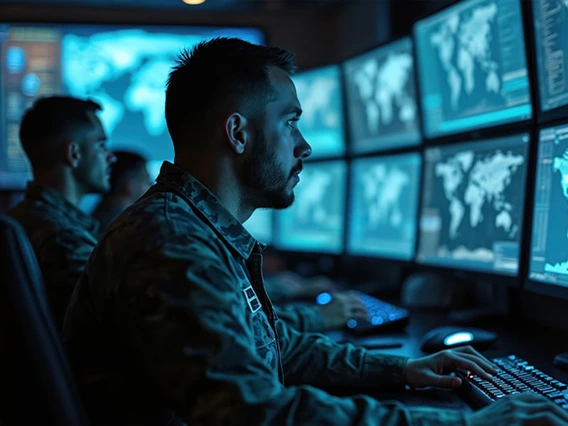
The College of Information Science (InfoSci) offers undergraduate minors and certificates in a wide range of information-related areas that will support your major and help prepare you for a dynamic, data-driven future.
InfoSci Undergraduate Minors
All College of Information Science minors are 18 units.

The Artificial Intelligence (AI) and Society minor examines the ethical, social and policy impacts of artificial intelligence without requiring coding. Open to students from all disciplines, the program explores issues such as bias, privacy, surveillance and the future of work, preparing students to engage responsibly with AI across industries and the public sector.

The Applied Computing minor integrates advanced computing skills into the student's major field, allowing them to become a sophisticated user of computing technology with the ability to design systems and solve real-world problems across a variety of platforms and industries.

Collect and analyze cyber-based evidence through hands-on learning. As cybercrime rises and the demand for information security professionals grows, the program equips students with the knowledge and skills needed to succeed in a variety of fields.

The eSports minor provides students a general understanding of eSports industries, gaming communities and the social issues related to gaming for sport. Students will learn about recent gaming trends in society and related employment trajectories possible in eSports. This minor is available on campus and online.

The Games and Behavior minor provides students not only with a broad understanding of important design principles and human behavior in games, but also the implications of gamification in society, without the need for extensive knowledge in computer programming, although technical classes are available to students with appropriate prerequisites. This minor is available on campus and online.

The Game Design and Development minor provides students an introduction to programming, design and game development fundamentals. Students in this minor study and develop games both for entertainment and other applications and purposes. This minor is available on campus and online.

The Information Science and eSociety undergraduate minor focuses on issues in contemporary digital society from a variety of disciplinary vantage points. This interdisciplinary, dynamic minor is therefore an ideal add-on for just about any major on campus.

In the Information Science, Technology and Arts minor students learn about all facets of information: deriving it, managing it and extracting meaning from it. The minor draws from core college courses in our BA and BS in Information Science degrees and is a great complement to almost any U of A major.

Th Library and Information Science minor is a great introduction for work in any information context related to libraries, archives, special collections, material preservation, heath information management and more, and serves as a prelude to the college's top-ranked Master of Arts in Library and Information Science. This minor is offered on campus and online.
InfoSci Undergraduate Certificates

The Cloud Computing certificate provides undergraduate students the confidence and training they need to leverage virtualization and cloud technologies to support small and large businesses and government and non-governmental organizations. It will develop the necessary skills and confidence for tackling the complicated infrastructure related to virtualization, Amazon Web Services and Microsoft Azure.

This certificate equips students to design secure network architectures, use defensive technologies, apply cyber threat intelligence, perform threat hunting and network security monitoring, and respond to cyber incidents. Students gain hands-on experience securing Linux and Windows systems, analyzing network traffic, detecting anomalies, blocking command and control operations, conducting incident response and managing Zero Trust Networks in on-premises and cloud environments.

The Cyber Operations undergraduate certificate provides students a springboard to becoming a cybersecurity practitioner, academic or researcher. Students to advance the concepts and principles of cybersecurity across different disciplines, threats and technologies.

The Cybersecurity undergraduate certificate is designed to provide students in related fields with the opportunity to earn a certificate in the fast-growing and critical field of cybersecurity.

The Data Science and Visualization certificate is designed for students who want to develop their skills and the confidence for tackling messy, real-world data problems using modern programming languages.

The Games and Simulation undergraduate certificate is for students who want to develop the skills necessary to create virtual interactive environments that span devices and platforms.
Declare Your Minor or Certificate
Any advisor can declare our minors or certificates, but you may also declare a minor or certificate online.
Course Multiple Use
You may use the same courses for up to 8 units of credit (2 courses) in College of Information Science minors, as long as the courses are approved for both programs and the multiple use is allowed within the other major or minor's double-dipping policy.
Archived Checklists & Plans
Access degree, minor and certificate archived plans here:
View Archived Checklists & Plans
To learn more about a College of Information Science minor or certificate, contact the appropriate undergraduate academic advisor.

